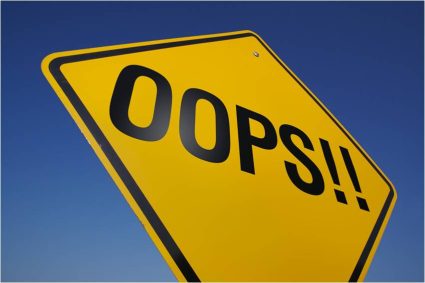Four of the most powerful but least used words in business or human relationships are, “I made a mistake.” There are another three powerful words, “I was wrong.”
They are tough words to say, but think of the impact they have in moving things forward, in building relationships/trust.
In everything we do in selling (and business) there is always the possibility of making a mistake. Perhaps we ask our customers the wrong questions, failing to discover their real business drivers. Perhaps we have developed a strategy we thought would win, but later realize we were doing the wrong things. Perhaps we had an assessment of an individual–a customer, a colleague, one of the people that we lead, our own leadership that was incorrect. Perhaps, we forecast a deal coming in at the end of the quarter, and it slipped.
We never purposefully look to make mistakes or err, but despite our best judgment and efforts, we do make mistakes. We do err.
Perhaps the biggest limiters to our individual and organizational growth are:
- Failing to recognize we have made a mistake or have been wrong.
- Failing from learning from it, taking corrective action and moving forward.
I’m amazed at the time and opportunity wasted when I sit in meetings seeing people assigning blame. We don’t solve problems, we don’t change and grow by assigning blame. And as long as we focus on assigning blame, failing to recognize and admit that we may have been mistaken, we will continue to make the same mistakes. Whose “fault” it may be is irrelevant, correcting what we do is critical.
We won’t always be successful. If we were, the concept of win rates, retention rates, renewal rates would be meaningless.
We are, rightfully so, pleased with our success and aspire to greater success. But we don’t learn much from the success, we keep doing what we have always done, until it no longer works.
We learn more from our mistakes. We get the opportunity to see what went wrong, we get the opportunity to see things we may be missing, we get the opportunity to look at how we might change.
It is through our mistakes we discover new opportunities, things we may have never imagined.
It takes courage to admit mistakes, or to say that we were wrong. But getting to the other side of those mistakes is where all the growth opportunity is.
Try this as an exercise:
- At the end of every week, think of the biggest mistake you may have made, or something in which you were wrong. If you can’t think of any, you aren’t being honest with yourself.
- Once you have identified it, think about how to solve it. But don’t do it alone, ask your manager, ask a colleague, ask your customer. Engage them in helping you think of what you might do differently to change the outcomes.
- Doing this on a weekly basis probably won’t have you identify the “big rocks,” but it will help you make incremental improvements. It will, also, increase your sensitivity to identifying the “big rocks” when they occur–and they always do.
Afterword: I wrote about this before, it’s actually a great article: I Made A Mistake.
Afterword: This is a very concise AI generated commentary on this post. Enjoy!

Leave a Reply